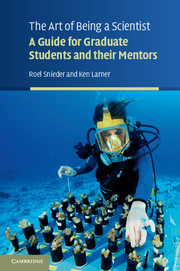Book contents
- Frontmatter
- Contents
- 1 Introduction
- 2 What is science?
- 3 Choices, choices, choices
- 4 The adviser and thesis committee
- 5 Questions drive research
- 6 Giving direction to our work
- 7 Turning challenges into opportunities
- 8 Ethics of research
- 9 Using the scientific literature
- 10 Communication
- 11 Publishing a paper
- 12 Time management
- 13 Writing proposals
- 14 The scientific career
- 15 Applying for a job
- 16 Concluding remarks
- Appendix A Further reading
- Appendix B A sample curriculum
- Appendix C The Refer and BibTeX format
- References
- About the authors
- Index
9 - Using the scientific literature
Published online by Cambridge University Press: 05 June 2014
- Frontmatter
- Contents
- 1 Introduction
- 2 What is science?
- 3 Choices, choices, choices
- 4 The adviser and thesis committee
- 5 Questions drive research
- 6 Giving direction to our work
- 7 Turning challenges into opportunities
- 8 Ethics of research
- 9 Using the scientific literature
- 10 Communication
- 11 Publishing a paper
- 12 Time management
- 13 Writing proposals
- 14 The scientific career
- 15 Applying for a job
- 16 Concluding remarks
- Appendix A Further reading
- Appendix B A sample curriculum
- Appendix C The Refer and BibTeX format
- References
- About the authors
- Index
Summary
I must say that I find television very educational. The minute somebody turns it on, I go to the library and read a book.
Groucho MarxTraditionally the academic library has been the repository for the archiving of books and journals for scientific research, also offering a place for reading and study. It is much more than that today. By making available large and readily searchable databases of books and publications, these libraries have come to offer researchers the capability to search the scientific literature with remarkable efficiency, retrieving relevant publications electronically when possible.
Indeed, retrieval of scientific information is increasingly being driven by electronic tools and information technology. While this development opens up new possibilities for the efficient search and retrieval of information, it does so in the face of a new problem: the amount of information available is vastly larger than what the individual human mind can process. It therefore is essential to access this superabundance of information in ways that actively supports the research. The options available nowadays could be bewildering, making it important to be aware of, and use, the right tools for gaining access to the appropriate information. Most academic libraries offer valuable assistance and suggestions through their websites. Moreover, typically the staff of these libraries have the expertise as well as the desire to offer advice and share their expertise with those seeking help.
- Type
- Chapter
- Information
- The Art of Being a ScientistA Guide for Graduate Students and their Mentors, pp. 132 - 145Publisher: Cambridge University PressPrint publication year: 2009



